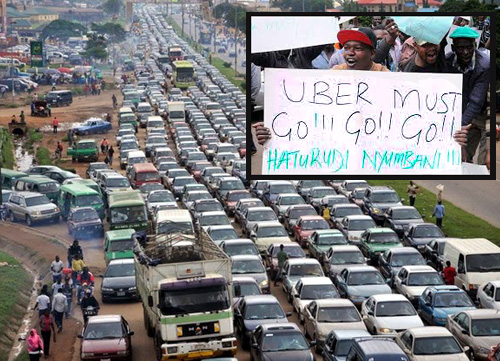 In Nairobi and New York consumers were mad, local government knew what it had to do but claimed not to have the money to do it, so private investors stepped in: Uber Alles.
In Nairobi and New York consumers were mad, local government knew what it had to do but claimed not to have the money to do it, so private investors stepped in: Uber Alles.
Today the head of the Nairobi taxi association gave the government one week to “do away with” Uber or they will “grind the city to halt.”
That won’t be hard to do, since the city is more or less ground to a halt already. The 10-12 mile ride from the airport into the city normally takes two hours because of unbelievable traffic.
The government seems to be siding with Uber.
Tension is seriously building. Uber has been here for just over a year, and rates Nairobi as one of its biggest successes. In the beginning it was mostly expats (non Kenyans) who used the service, but very soon thereafter the idea swept the city.
Uber, in fact, was so impressed with the Nairobi response that it reversed the previously strict policy not to accept cash payments for a ride.
Here’s how it boils down in this city of too many cars and truly unimaginable traffic:
A ride from the airport into the city by a registered taxi is pegged at around $50. Few consumers pay that. Bargaining prevails and even the most inexperienced consumer can get $15 off right away. I normally get them down to $25. Uber’s formulaic calculations will render anything from $12-$18, and usually the higher because of traffic congestion.
Uber’s policy excludes tipping, but believe me, Nairobi Uber drivers let you know a tip is most welcome and I expect many users tip here.
Nairobi’s monopolistic taxi service is so similar to taxi services around the globe, and that’s one of the reasons Uber is seamlessly entering every corner of the globe. Traditional taxi service is supposed to be insured and licensed by the government. In Kenya the effective tax is about 3% (60 Ksh per available car seat per day of operation). Union “dues” take another 3%. And the union is in full control of car placement and driver hiring and eligibility.
Of course, it doesn’t work like that. Taxes are rarely paid or massively miscalculated. A driver often splits his fare with others in his neighborhood and even more so, with touts that round up customers from the streets. This is gross speculation: but I imagine when all is said and done the driver takes home about 50% of the fare paid.
With Uber he takes home 80%, but the fare is a quarter to a third less. Bottom line: it’s a scratch for the cabbie.
But the consumer wins big. The technology of near instant service and easy payment – something the cities should have done long ago – is value itself, but the fare is less.
Here’s the problem: it’s a capitalistic race to the bottom.
Before the consumer even discovers that Uber cars are usually as good if not better than taxis, that they are more prompt, that tipping is no longer necessary, they are drawn by the lower price. Particularly in a developing country like Kenya with all the problems this city has, taxi users here would probably complain if the ride were free.
Price is the driver, the raison d’etre for Uber’s success and Uber geniuses have found a way to scrape the little bit of earnings that don’t actually pay for getting from here to there into their own pockets…
… out of the hands of the tout, the politician and who knows who else. Those folks are cut out by Uber to the benefit of the consumer AND …
… the benefit of Uber. Uber takes 20%.
Uber made about a quarter billion dollars last year and is valued around $65 billion, making it larger than America’s largest car companies.
The portion of Uber earnings that came from Kenya has impoverished many, contributed to more crime and now threatens to bust one of the few unions left in the country.
There’s a solution here. Government has to get its act together. Uber claims it would welcome regulation, so let’s regulate. Let Uber take over the taxi business, but let the unions represent all the workers, including Uber drivers. How’s that for a start?
Totally unexpected.